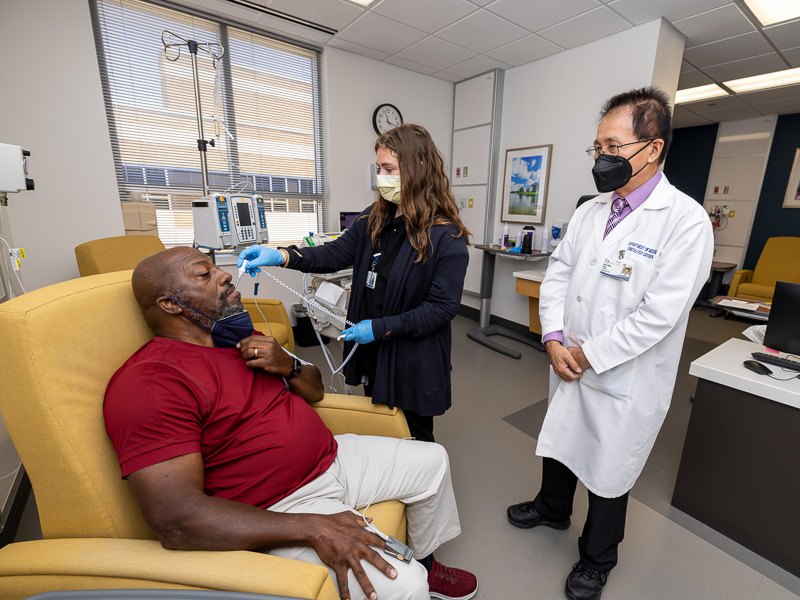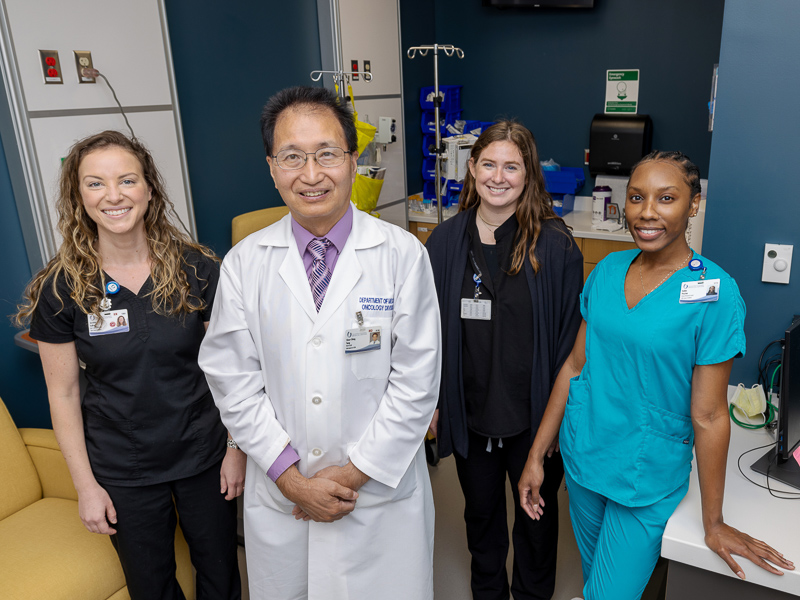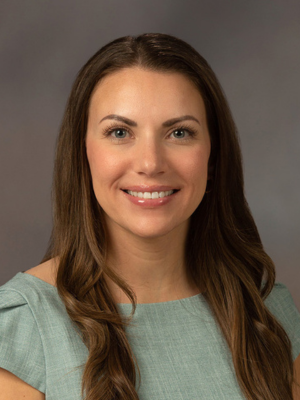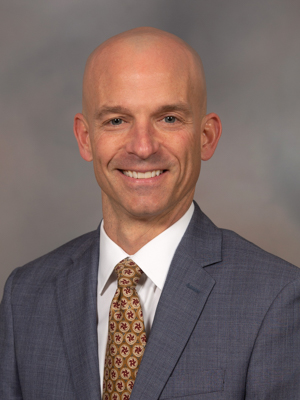Phase 1 cancer trials offer UMMC patients critical treatment options

Two years later, the CCRI associate director, who had conducted more than 40 Phase 1 trials at other medical centers, had secured UMMC its first Phase 1 cancer trial.
To date, Tang, also tenured professor of medicine and pharmacology/toxicology, has conducted seven Phase I trials at UMMC, four still underway, in the span of just three years, that have brought more than $4 million in funding to the Medical Center.
Clinical trials for experimental drugs and treatments consist of four phases, according to the National Institutes of Health. Phase I evaluates drugs for safety, dosage and side effects in a small group of people. If deemed safe, they are administered in Phase II to a larger group of people to determine effectiveness, then on to Phase III, where they are compared to standard of care therapy. After the drug gains FDA approval, researchers continue to track its safety, risks and benefits during Phase IV.

“Phase 1 programs are the gem of clinical research trials because you are testing drugs that have never been tested in humans, and the companies spend millions of dollars to develop them,” said Tang. “It’s high risk but high reward. If it doesn’t go well, the drug development is killed, and we would have wasted millions of dollars in preclinical development.”
Because pharmaceutical companies only need to sponsor clinical trials at three or four medical centers when testing a new drug or treatment, the application process is more competitive than other trials.
“It’s very prestigious to be selected,” said Tang. “If you do Phase 1 trials, you’re considered up there.”
Before Tang, whose specialty is breast cancer research, began conducting Phase 1 trials at UMMC, cancer patients who had exhausted all other treatment options had to travel out of state to facilities including MD Anderson Cancer Center, Memorial Sloan Kettering Cancer Centers and Vanderbilt University Medical Center for clinical trials. Now, patients referred out of state are being referred back to UMMC. Half the Phase I patients enrolled are from community oncologists, thanks to a robust and collaborative referral network Tang established.

“They’ve also advanced our understanding of the disease and elevated the institution as a major cancer research and treatment center,” Musshafen said.
Through Phase 1 trials sponsored by companies including Pfizer, Incyte and Innovent, Tang has helped develop cancer drugs designed to fight advanced malignant tumors that have failed standard therapy.

“The ability to offer novel and innovative therapies for cancer patients in Phase I trials is such an important part of the offering of cancer care to Mississippians,” said Jones. “There are thousands of new drugs in the pipeline for cancer care, bringing an environment of hope.”
Internationally recognized for his research, Tang receives frequent referrals to treat out-of-state patients, and just two months ago, one from the United Kingdom.
Ten biotech companies wanting to do clinical trials at UMMC are now on a waiting list. But that wasn’t always the case. When he first approached those same companies five years ago, they weren’t interested.
“They needed to see a track record,” Tang said. “Of course, we didn’t have one. Through my connections and relationships, they came.”
His success in part can be attributed to a pipeline program he created: Once a month, he invites one drug company to UMMC to present new products to cancer research clinicians.
“They tell us what their new drug is and how we can partner with them. Before we didn’t have one Phase I trial. Now we have to many to handle.
“We are running 30 to 40 trials in different phases to cover all the tumors, head to toe. I’ve brought in 48 companies to this center in five years. Many of them had never been to Mississippi before.”
The impact of Tang’s prolific clinical trials extends beyond Phase 1 studies, said Dr. Joey Granger, associate vice chancellor for research.
“It also paves the way for our cancer patients to receive state-of-the-art treatment at UMMC through Phase II and III trials,” said Granger.
In his career, Tang has conducted more than 100 Phase I, II and III trials.
Closer to home, Tang designed UMMC’s first investigator-initiated cancer Phase I trial for Immulina, an extract from the microalgae spirulina discovered by the Natural Product Research Institute at the University of Mississippi. Though it had already been marketed and sold as a nutritional supplement, it was not being used as a drug.
“So I designed a trial to study it,” Tang explained. “It took me a year and a half. We are now FDA approved to test it as a cancer drug. It boosts the immune system. That’s why it has the potential to become a drug to kill cancer cells in the presence of other immune boosting cancer drugs called check point inhibitors which have revolutionized current cancer treatment.”
Until last month, Tang and nurse coordinator Jessica Solise conducted all of his clinical trials as a two-person team. He now also has a study coordinator and physician assistant to help manage his multiple projects.
Born in China, Tang earned his medical degree 40 years ago. He went on to the University of Alberta Edmonton in Canada, where he received a doctorate in molecular biology and completed his internship, residency and fellowship.
Before coming to UMMC, he helped build cancer centers, cancer programs and research organizations at institutions including University of Miami, Mayo Clinic, University of Colorado and Georgia Cancer Center.
His passion for cancer research is the reason he married late. He simply did not have, or make, the time. Now, when his peers brag about their grandchildren, Tang shares photos of his 4-year-old twin boys.
“Because of all the Phase 1 trials going on at the same time, I have had to be available at nights, weekends, or whenever, because of the ongoing infusions and blood work,” he said.
“We have encountered a lot of obstacles, including initial reluctance by sponsors, lack of infrastructure, and personal sacrifice, which I did willingly. I am thankful to our leadership for their support in increasing our clinical research for the benefit of patient care in Mississippi.”


